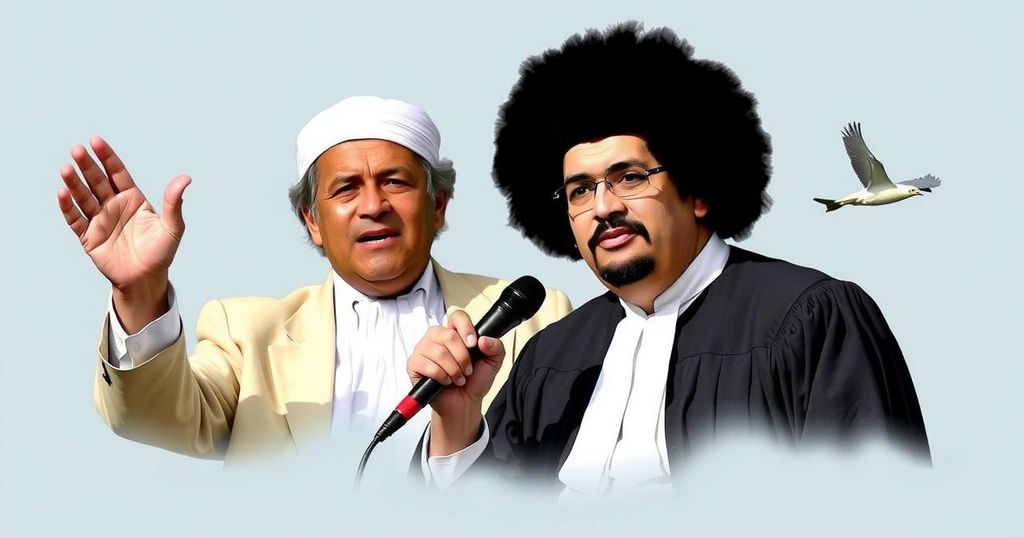World news
ANDRES MANUEL LOPEZ OBRADOR, ASIA, ASSOCIATED PRESS, BOLIVIA, CONSTITUTIONAL COURT, CORRUPTION, CUBA, DEMOCRACY, EL SALVADOR, EV, EVO MORALES, LATIN AMERICA, MARIS, MARISOL NOGALES, MEXICO, NORTH AMERICA, OPPOSITION, PHILIPPINES, POLITICS, SOUTH AMERICA, THE ASSOCIATED PRESS, TRADE RELATIONS, TRIBUNAL
Fatima Khan
0 Comments
Bolivia’s Judicial Elections: A Divisive Experiment with Democracy
Bolivia uniquely elects its top judges through a popular vote, a system criticized for politicizing the judiciary. The upcoming election has faced numerous controversies including a delay, raising concerns about the system’s legitimacy and independence. With only four out of nine judicial seats open, experts worry about an erosion of checks and balances. This situation has profound implications for democracy in Bolivia and offers lessons for other nations such as Mexico.
Bolivia stands as the only nation globally to conduct popular elections for its top judicial positions, a system that has engendered significant controversy and debate. In the capital city, La Paz, while campaigning is officially banned, candidates have creatively utilized unconventional methods to increase their visibility among voters with limited information about the numerous candidates on the ballot. This electoral model comes at a time when the country’s judiciary has faced accusations of political allegiance, primarily as the current President Luis Arce navigates intra-party challenges with former President Evo Morales.
This electoral practice, initiated over a decade ago, has heightened concerns among voters and experts alike, with many feeling that it transforms courts into political tools rather than unbiased arbiters of justice. Disillusionment is palpable amongst the electorate, as evidenced by statements from students describing their indecision regarding their votes. Moreover, the recent postponement of the judicial election has drawn criticism from the Inter-American Court of Human Rights, highlighting fears of undermining the justice system’s functioning. The current judicial election represents only a partial and highly contentious process, with only four of the nine Constitutional Court seats available for contention.
Judicial elections, particularly in Latin American contexts, are seen as contentious due to their potential to politicize the legal system significantly. In Bolivia, a concerning pattern has emerged wherein elected judges have facilitated political maneuvering, notably seen in Morales’ attempts to circumvent constitutional limitations through the courts. With the impending elections, the legitimacy of the judicial system hangs in the balance as skepticism regarding its independence escalates. The outcome of the Bolivian vote may offer insights for other nations, particularly Mexico, as they consider similar reforms in their judicial frameworks, with the world observing how this unique electoral experience unfolds.
Vargas, the vice president of Bolivia’s electoral tribunal, humorously reflected on the likelihood of recommending Bolivia’s approach to other nations, highlighting the contentious nature of the system in practice.
Bolivia’s judicial election system has become a focal point of political discourse, being distinct globally for allowing the populace to elect their judiciary. Originally instituted as a reform to combat corruption and enhance democratic engagement, this system has arguably led to greater politicization of the judiciary rather than impartial governance. The intersection of political rivalry, particularly between currently opposing factions such as those loyal to Luis Arce and Evo Morales, has exacerbated tensions surrounding judicial independence, resulting in significant implications for democracy within the country. This context necessitates understanding the delicate balance involved in judicial appointments and the risks of diminishing the rule of law in favor of political gains. The controversy over this electoral approach is underscored by the historical context, notably how Morales leveraged judicial power to extend his political tenure amidst significant public opposition. The lessons drawn from Bolivia’s judiciary may influence regional peers, notably Mexico, as it contemplates similar electoral reforms in response to public outcry over corruption and demands for greater accountability within judicial systems. Reasons for concern about the effectiveness of such electoral models are underscored by expert analyses from across Latin America, which highlight the inherent risks these electoral systems pose to democracy and the rule of law.
In conclusion, Bolivia’s unique system of electing judicial officials reveals significant implications for democracy and the independence of the judiciary. The intertwining of electoral politics with judicial proceedings raises grave concerns about impartiality and accountability, raising alarms among regional observers. As the nation prepares for its upcoming judicial elections, the outcomes will likely serve as a critical case study for other countries considering similar models, specifically regarding the balance between electoral democracy and judicial independence, and the risks involved in politicizing judicial appointments.
Original Source: abcnews.go.com




Post Comment